* This website participates in the Amazon Affiliate Program and earns from qualifying purchases.

As the political landscape in the United States continues to shift, the recent firings of inspectors general by the Trump administration have sparked intense debate and scrutiny. Amidst these developments, Senator Chuck Grassley, a prominent figure in the discussions surrounding oversight and accountability, has drawn attention. But what does this mean for the future of federal oversight?
In an unprecedented move, the White House defended the decision to dismiss several inspectors general, citing Supreme Court precedents that grant the president broad powers in this domain. This has raised significant legal and ethical questions about the boundaries of executive authority and the role of oversight bodies. Among the most notable reactions is that of the former inspectors general themselves, who caution that these actions threaten the integrity of accountability within federal agencies.
Mark Greenblatt, the former Inspector General for the Department of the Interior, recently expressed his concerns during a discussion about the implications of these firings. He warns that the dismissal of inspectors general undermines their role as watchdogs over federal agencies, potentially allowing for misconduct to go unchecked. This warning resonates with many who fear that without a robust oversight mechanism, government accountability could falter, leading to greater corruption and less trust in public institutions.
Many lawmakers, including Senator Grassley, who has long championed accountability in government, are concerned by the precedent these firings set. The legal framework requires that Congress be given a 30-day notice prior to the firing of an inspector general, a provision that was not honored in these recent cases. The failure to comply with this rule raises alarms about the respect for legislative oversight, a fundamental aspect of the checks and balances system designed to prevent misuse of power.
The White House's reliance on previous Supreme Court rulings, such as the Seila Law LLC v. Consumer Financial Protection Bureau case, to justify these firings, reveals a complex intersection of legal interpretation and political strategy. While the administration asserts the firings were executed within its rights, critics argue that this creates a dangerous precedent where executive power could overshadow the legislative authority intended to safeguard against abuse.
In response to the growing concerns, Congress has passed legislation aimed at tightening the rules surrounding the dismissal of inspectors general, which now require a substantial rationale for such actions. This development reflects a bipartisan recognition of the importance of these roles in maintaining oversight. However, the speed with which these changes have been implemented is a cause for concern, suggesting that the issue may not be fully resolved.
Ultimately, as discussions continue around trust in government and the need for oversight, the actions of the Trump administration raise critical questions about the future of inspector generals and their investigations. Will Congress take further action to protect these positions, or will political considerations continue to dictate the landscape? The answers to these questions are crucial as they will determine not only the effectiveness of federal oversight but also the public's trust in the institutions that serve them.
In conclusion, as Chuck Grassley and other lawmakers navigate this evolving scenario, it remains imperative for citizens to stay informed and engaged. The balance of power in government is not only a legal issue but a fundamental aspect of democracy that requires active participation from all stakeholders involved.
* This website participates in the Amazon Affiliate Program and earns from qualifying purchases.